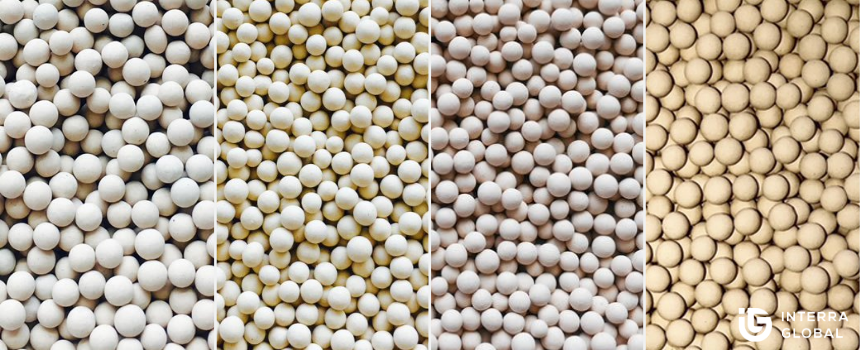What is Molecular Sieve?
Molecular sieves are synthetic zeolite materials engineered with pores of precise and uniform structure and size. This allows them to preferentially adsorb gases and liquids based on molecular size and polarity. Zeolites are naturally existing, highly porous crystalline solids, belonging to the class of chemicals known as aluminosilicates.
There are four main types of molecular sieves: 3A, 4A, 5A, and 13X. The type is dependent on the molecule’s chemical formula, and it determines the pore size of the molecular sieve. A molecular sieve works by adsorbing gas or liquid molecules that are smaller than the effective diameter of its pores, while excluding those molecules that are larger than the openings.
A practical example of the function of molecular sieves is to dry ethanol. Because of the azeotrope formed when it is mixed with water, normal distillation of ethanol can only achieve a purity of 96% ethanol – the remaining 4% being water. For ethanol to be considered fuel grade, it has to be greater than 99% dehydrated. To achieve this level of purity, a 3A molecular sieve, designed specifically with 3 Angstrom-sized pores, is used to adsorb the water molecules, while the larger ethanol molecules are excluded. As there is no competition for adsorption, this process easily dehydrates ethanol to the desired level of purity so that it can be considered fuel grade.
The size of the pores of both Type A and Type X molecular sieves is closely controlled during the manufacturing process. Sodium, calcium, and potassium ions can be exchanged with one another in the molecule to regulate the size of the pore opening. This allows for preferential adsorption of gas and liquid molecules. To get a sense of how this works, try to imagine a parking garage: the height of your vehicle is 7′, but the roof of the garage is only 6’8″. As hard as you may try, you are not going to get your vehicle into the garage. The same principal applies to the adsorption of molecules in the pores of a molecular sieve. This allows scientists and engineers to design systems that can separate chemicals on a molecular level.
Many people do not realize all of the applications of molecular sieves that help to improve our everyday lives. Almost every imaginable product has been touched by molecular sieve in some way. From steel production, insulated glass windows, fuel ethanol, and oxygen for breathing apparatuses, to the air conditioning filter cores in our cars, molecular sieves are a part of our lives every day.
Interra Global strives to supply the highest quality molecular sieve available in the market. We take this responsibly seriously and feel a great deal of obligation to bring exceptional products to our customers, who rely on our outstanding control of quality to make the goods we use everyday.
For more information on Interra Global’s line of mSORB® Molecular Sieves, contact us at info@interraglobal.com or 847.292.8600.



